How to Garden With 5-Gallon Buckets
Today it’s all about how to garden with 5-gallon buckets. Here’s the deal, we can’t all have 1-20 acres of land, right? Some of us have a postage stamp-sized lot like me, some have a porch and others have a balcony. But I’ll bet we all love picking those homegrown fresh sweet tomatoes in the summer. If you have ever had a garden, big or small, that first red tomato is gold, my friends. Maybe not worth as much as gold, but oh my gosh, I can smell the bacon cooking right now to go with those tomatoes to make the very best BLT!
In my neighborhood, very few people have a garden. In my humble opinion, I’m not sure they love to garden as much as I do. I love getting my hands in the soil of the earth and experimenting with what I can grow in the desert. The good thing about living in Southern Utah, I can have two gardens if I plan ahead. I start seedlings inside while my garden is coming to an end outside. Now, I also have to cover the tomatoes with garden shade cloth to help modify the temperatures. This is the product I have used, Garden Shade Cloth. With that being said, I think it’s important to grow your own food whether inside, in a yard, in a bucket, or in a raised garden bed.
Updating Post Today
I’m updating this post today because as you know I have moved to Northern Utah where it’s much cooler. We’re getting closer to obtaining our home permit to build, but gardening may be put on hold once again. This is so frustrating to me because I love to garden and harvest fresh food daily. It’s been rough waiting and the price of food continues to rise. When I go to the grocery store I’m shocked each time I see the prices of eggs (if you can get them), milk, and of course meat.
I’ll be visiting the Farmer’s Markets this year to get homegrown veggies and fruits. Life is so good!
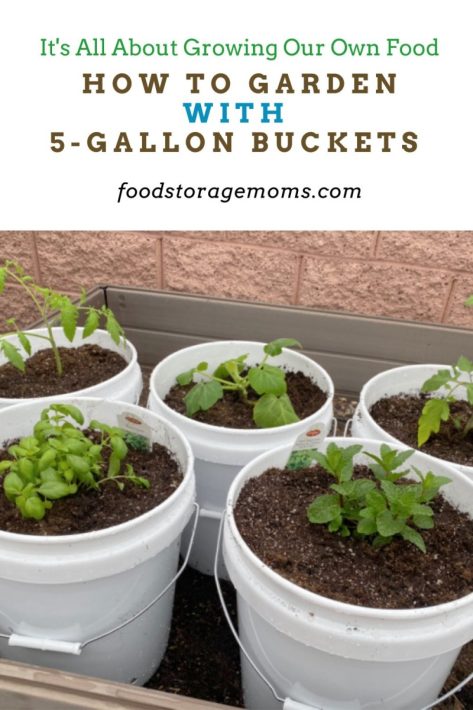
Why Plant Fruit and Vegetables in 5-Gallon Buckets?
You may be thinking, what in the world, why would I use a 5-gallon bucket to garden? Well, besides not having the space for an outdoor garden, there are a variety of benefits to using 5-gallon buckets. Here are just a few:
- You don’t need a huge backyard. You can grow food whether you have a backyard or not. In fact, you can even set these buckets right on your front porch or deck.
- It saves space. You still get plenty of food, but the buckets save space in your yard or another growing spot.
- Plants don’t get trampled. I don’t know about you, but when I had little ones running around, someone would seem to always trample something.
- They prevent rabbits and other small animals from eating your food. Although they could probably figure out how to get up in your plants, having them higher than ground level deters quite a bit of nibbling.
- No poor soil. When you put plants in a bucket, you know the potting soil is good for growing. And, you don’t have to deal with nasty weeds.
- The buckets are portable. If you notice your tomato plants aren’t getting enough sun, you can simply pick the bucket up and move it to a better location.
5-Gallon Bucket Gardening Cons
As stated above, there are a lot of benefits to gardening using a 5-gallon bucket. However, I do think it is important to note that there are also a few cons. Because the plants are in buckets, you may have to pay more attention to the plants than you would if they were planted in the ground. Here are the few cons that I found to bucket gardening:
- You have to water more often. Make sure you water your plants regularly. The roots can’t dig into the ground to find more water if they are thirsty and need more moisture. You do have to be careful not to overwater them. Having some drainage holes at the bottom of the bucket can help.
- The soil has to be replenished and amended. The soil in the bucket can’t replenish its nutrients as it would be able to in the ground. Each time you plant new plants, you will need to replenish and amend the soil with nutrients. Be careful when fertilizing to make sure you don’t apply too much fertilizer and burn the plants. Using a compost pile and applying the compost material is a more gentle approach that also eliminates the use of a bunch of chemicals.
- There’s a cost to materials. Obviously, you may need to buy seeds to grow a garden anywhere, but buckets cost a bit more than just planting in your yard due to the cost of the buckets and the purchased potting soil. I suggest using food-grade buckets that are safer but could cost a little more.
How to Garden With 5-Gallon Buckets
Not everyone has a plot of land they can use to plant a garden. With that being said, there are plenty of ways you can still grow your own food! Instead of digging up your yard, you can use 5-gallon buckets to plant a variety of plants and you may find you have plenty of room to place a bucket planter where it gets the needed sun.
Items You Will Need:
- 5-Gallon Buckets (food grade and BPA-Free)
- A drill with a 1/2-inch drill bit
- Gravel or small rocks called marble chips (I bought what was on sale at Home Depot)
- Potting Soil (I bought what was recommended for pots/containers)
- Plants, seeds, or seedlings
- Vermiculate (Regulates soil PH value and temperature of the soil)
Step One: Purchase Your 5-Gallon Buckets – BPA Free
Mark and I picked up five 5-gallon buckets at a local grocery store. They were in the paint department and priced at $2.99 each. I made sure they were BPA-Free and food-grade. I didn’t need the lids, so that saved me a dollar or so.
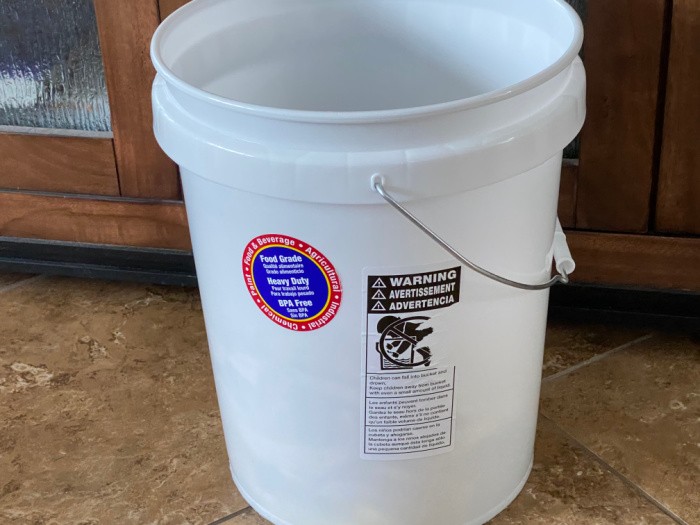
Step Two: Drill Four Holes in the Bottom for Drainage
We used a 1/2-inch drill bit to make four holes in the bottom of each bucket so the plants can drain after being watered. We just randomly drilled them, with no specific spacing.
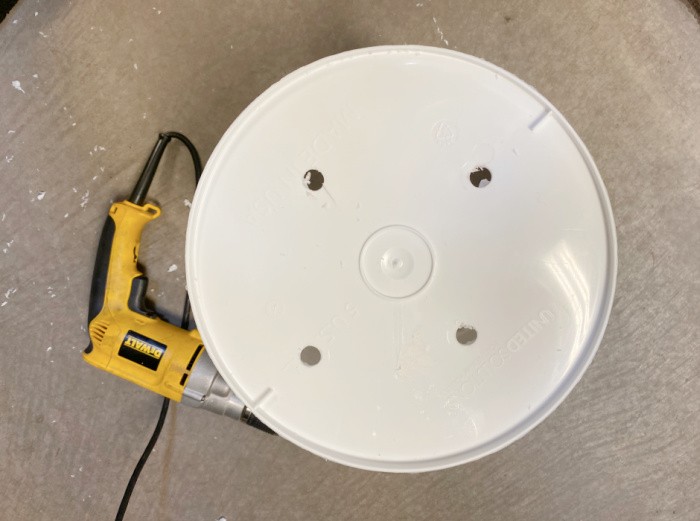
Step Three: Drill Additional Holes Around the Sides
Mark drilled four holes around the sides of the buckets (about 1-2 inches) from the bottom of each one to help circulate air to the roots within each container. We had to use some pliers to break off some of the plastic residues after drilling them.
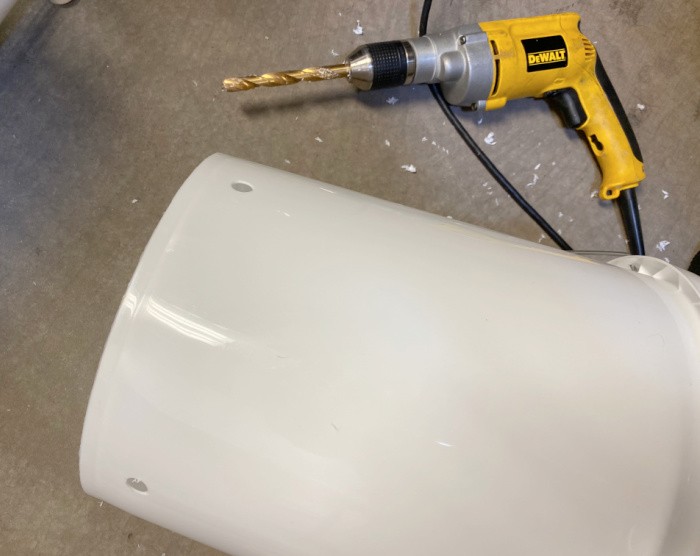
Step Four: Put Gravel or Small Rocks in the Buckets
When I went to find gravel, I couldn’t find any in a small quantity, so I opted for small rocks called marble chips. You need to fill each bucket with 2-3 inches of gravel, or in my case small rocks. To be honest, I didn’t want small gravel, I was afraid it would fall out of my 1/2-inch drilled holes.
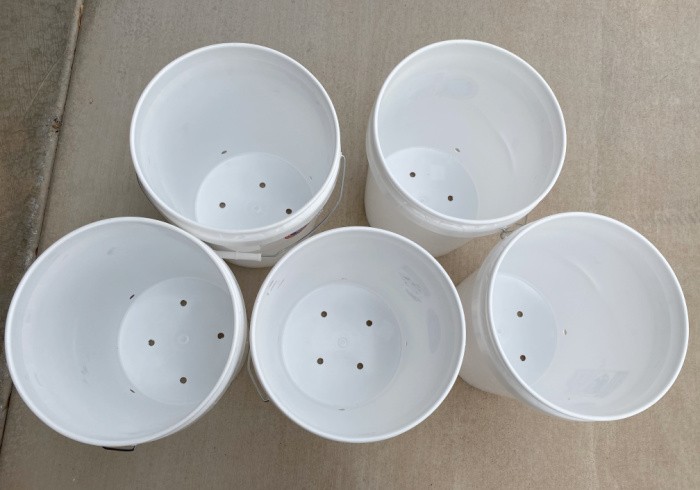
Step Five: Level Out the Gravel/Small Rocks
We put about 3 inches of rock (small rocks) in each 5-gallon bucket for proper drainage before we added the soil.
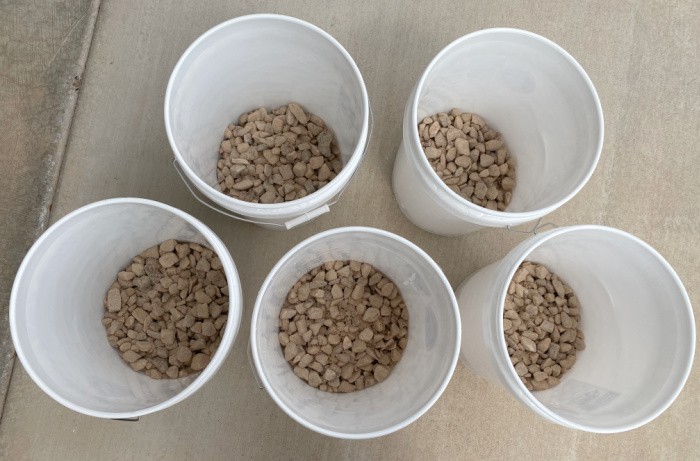
Step Six: Use Quality Potting Soil
This is the soil I purchased because it’s made by Dr. Q, a company I’ve had a good experience with, and it’s made specifically for containers. It’s organic and is formulated for planting in containers of all kinds.
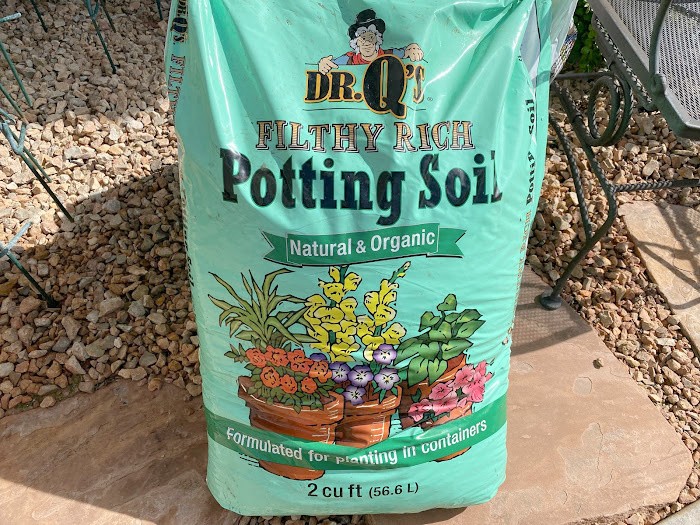
Step Seven: Fill Buckets with the Potting Soil
After filling the buckets with the rocks we purchased, we filled the 5-gallon buckets with the soil shown above.
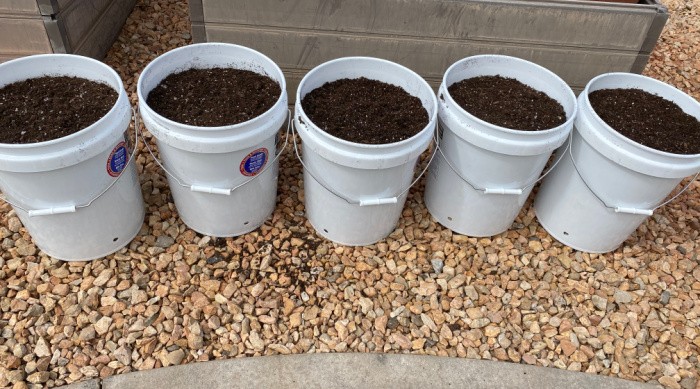
Step 8: Plant Your Seeds, Seedlings, or More Mature Plants
After you have set up your 5-gallon bucket, you can plant your seeds, seedlings, or plants into the buckets.
Why Do You Drill Holes in The 5-Gallon Bucket?
Don’t skip over drilling holes in your bucket. If you don’t drill holes, you may end up with dead plants. The holes help to protect your plants from water pooling up into the roots, especially during hard rains or excessive watering. If there is too much water for the roots, they can rot. Additionally, the plant won’t get enough oxygen and nutrients from the soil.
What Food Grows Well in 5-gallon buckets?
Unfortunately, not everything you may want to plant will grow well in a 5-gallon bucket. Below, I give you a list of what foods you can grow in your buckets and how many of each you should plant per bucket based on its diameter:
- Tomatoes. You can plant cherry or bush tomatoes as they work best. Keep in mind, you only want to plant 1 tomato plant per bucket to prevent overcrowding. Update: I must say tomatoes are the hardest ones to grow in buckets or pots. You will need more Vermiculate and have to do more watering each day. I lived in the desert where the summer temperatures would reach 115 degrees mid-summer. I used shades to lower the temperature a little, but they need a lot of water because the soil in the buckets can dry out quickly.
- Cucumbers. Cucumbers are great to grow since you can eat them in salads, pickle them, or just enjoy them with some ranch dressing. Plant only 1 plant per bucket. Space the buckets such that the plants have room to grow as they mature.
- Melons. I love a good watermelon. These get rather big, so, you will only want to put 1 plant per bucket. Again, you’ll want to spread them out some since watermelon plants can grow long vines.
- Squash. You can do all kinds of things with fresh squash. It grows well in a bucket, but you can only plant 1 plant per bucket.
- Eggplant. This is another one in that you can only put one plant per bucket.
- Peppers. Whether it’s hot pepper or bell peppers, only plant 2 plants per bucket.
- Beans. The best kind of beans to plant in a bucket are Bush beans. You can plant 3 plants per bucket.
- Onions. Not only are onions a good source of nutrition, but they can get expensive to buy all the time. You can plant 4 of them per bucket.
- Lettuce. We all need those leafy greens. You can plant 4 per bucket.
- Carrots. Great for your eyes and perfect as snacks, you can plant 10 carrots per bucket.
- Radishes. I love radishes on a salad. Plant radishes 10 Per bucket.
- Herbs. You can plant many different kinds of herbs in your bucket. One herb plant will spread and fill the entire bucket.
- Potatoes. I’ve had mixed results with potatoes. Since they are root plants, they need room under the ground to grow. Give them a try and see how it works in your area.
This is where I buy all of my garden seeds: SeedsNow.
5-Gallon Bucket Gardening Tips and Tricks
This gardening method is pretty straightforward, but along the way, you always learn a few tips and tricks. Here are a few to keep in mind when using 5-gallon buckets for gardening:
- Companion plants. Companion plants are beneficial and can help keep nasty bugs away while attracting good ones.
- Give the buckets a twist every week. Giving the buckets a quarter twist each week helps plants not to grow lopsided since they love to seek out the sun.
- Insecticides. You can combine four to five tablespoons of concentrated dish soap with one gallon of water to make insecticide. Mix it well and use a spray bottle to apply.
- You can reuse your potting mix. Amend it and replace it with fresh ingredients once per year, remove dead plants, and shake loose soil from roots. Fill it back up and use it again.
Seeds or Live Plants?
What is best to plant in your buckets, seeds, or live plants? I have used seeds, but many have said that live plants thrive best in buckets. If you don’t have a green thumb, I would suggest buying live plants. Today, I planted plants from the nursery. My seedlings are not big enough for a “picture” yet, Lol! I needed to get this post up for all to see. So many people don’t have access to land, so here they are provided an option to still have a successful gardening experience! I’ll be covering the plants tonight with domes to protect them from rain or frost.
Other Posts to Read
There are so many vegetables you can grow outdoors, depending on where you live. Check out my posts on what to plant each month of the year!
- What To Plant In January
- What To Plant In February
- What To Plant In March
- What To Plant In April
- What To Plant In May
- What To Plant In June
- What To Plant In July
- What To Plant In August
- What To Plant In September
- What To Plant In October
Garden Gloves
These are my favorite garden gloves: DIGZ Garden Gloves. They come in different sizes, that’s what I love the most. These are the best rose bush gloves: DIGZ Rose Bush Garden Gloves I have to get a large size for my hands. These are awesome! In case you missed this post, Container Gardens: Everything You Need To Know
Final Word
I hope you enjoyed my post today on how to garden with 5-gallon buckets. I love growing a majority of my food, and I bet you would like to! Life is good if we live and learn to work through food issues by growing fruits and vegetables. If you have a Farmer’s Market near you, you are so lucky! Let’s grow as much food as we can and support local farmers too, we can do it! May God Bless this world, Linda

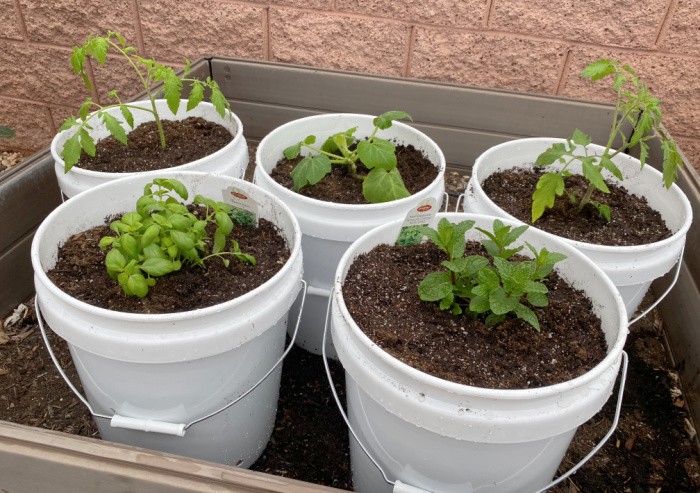

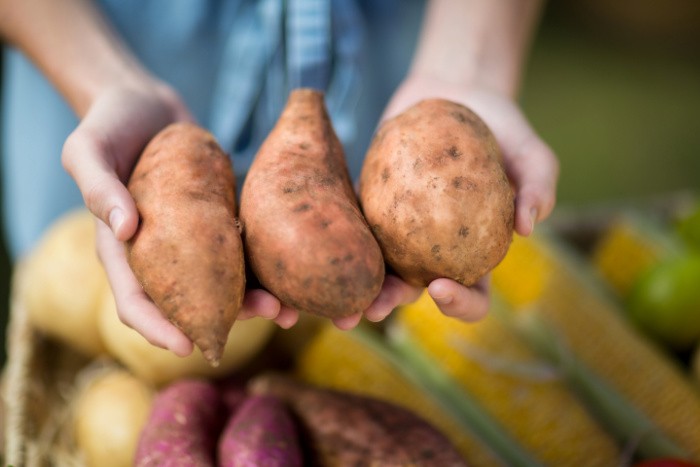
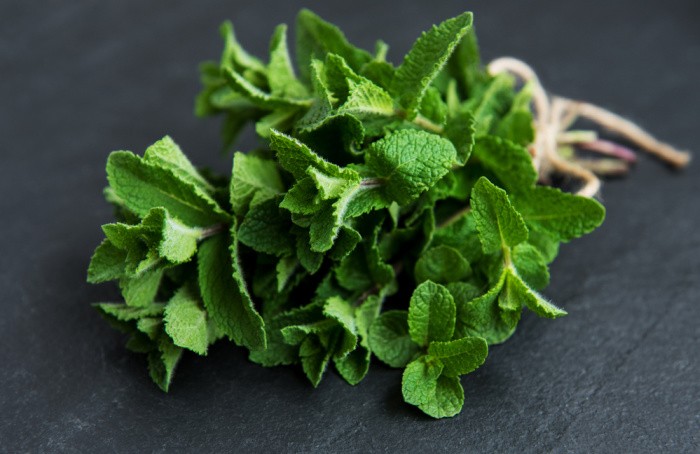
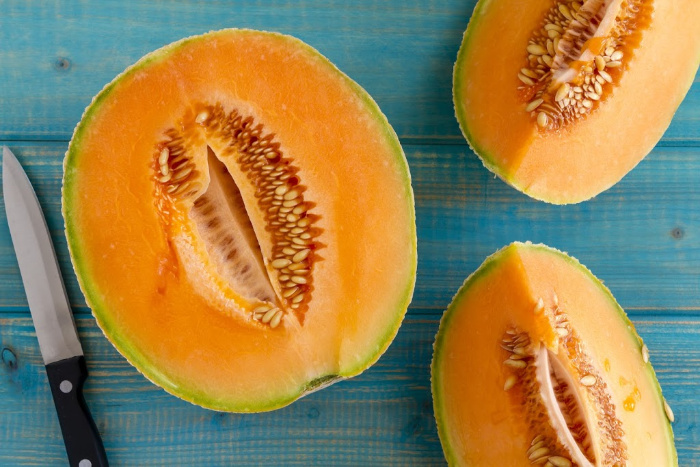
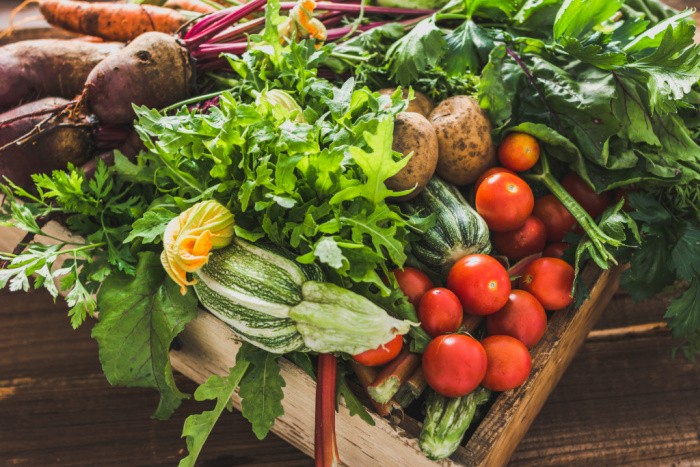
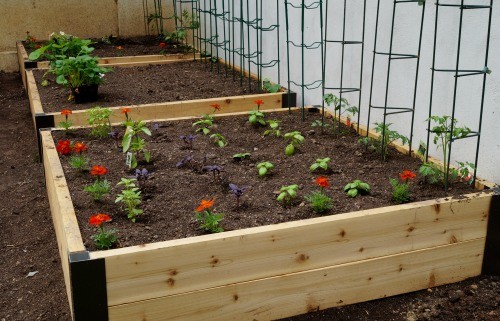
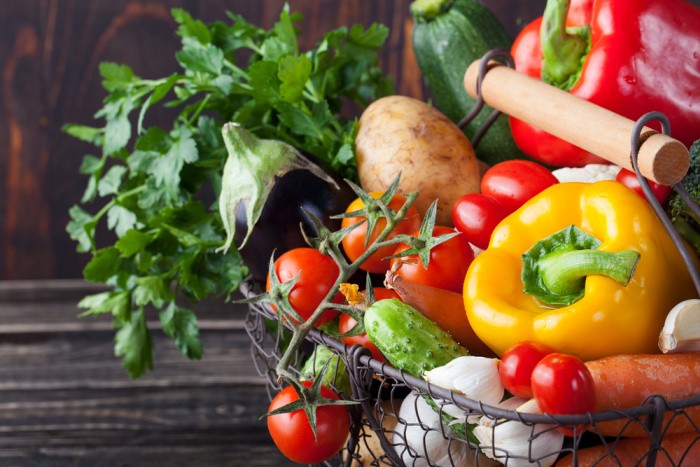
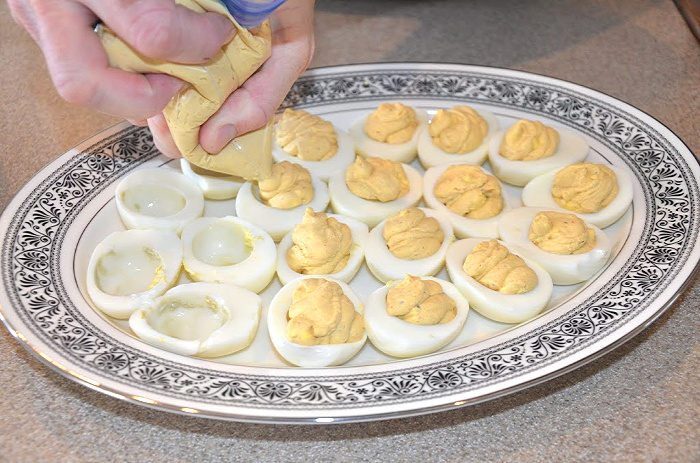
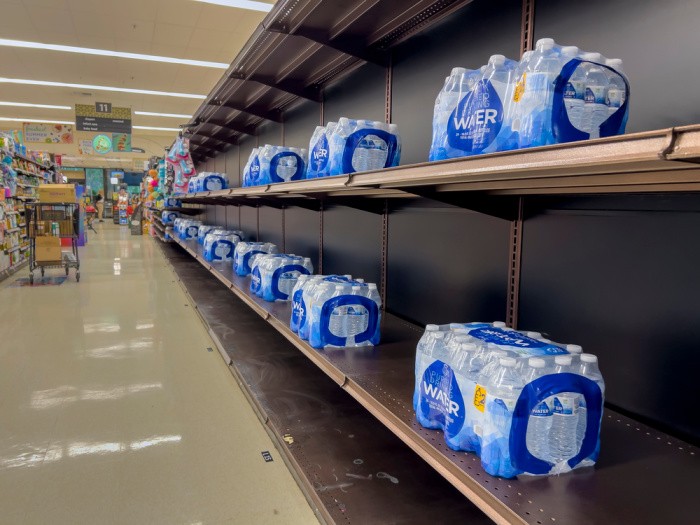
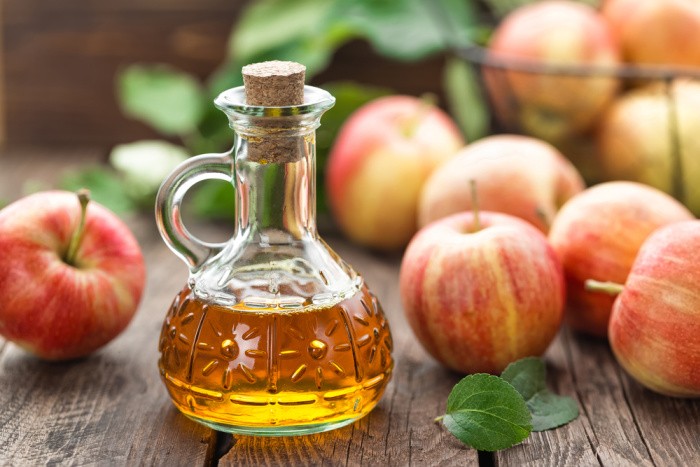

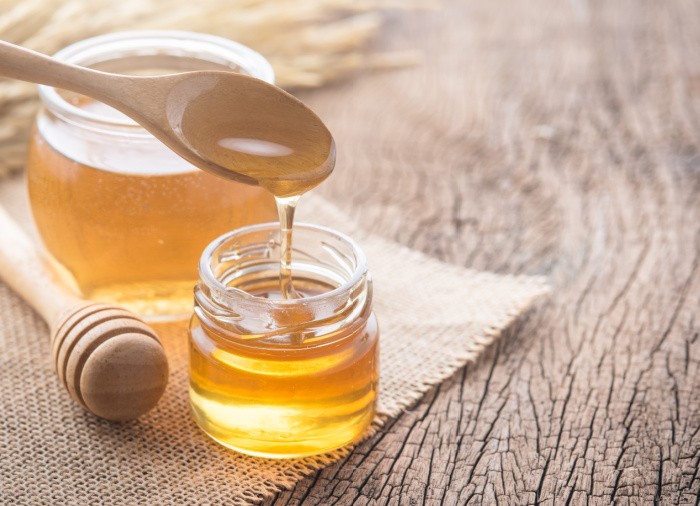
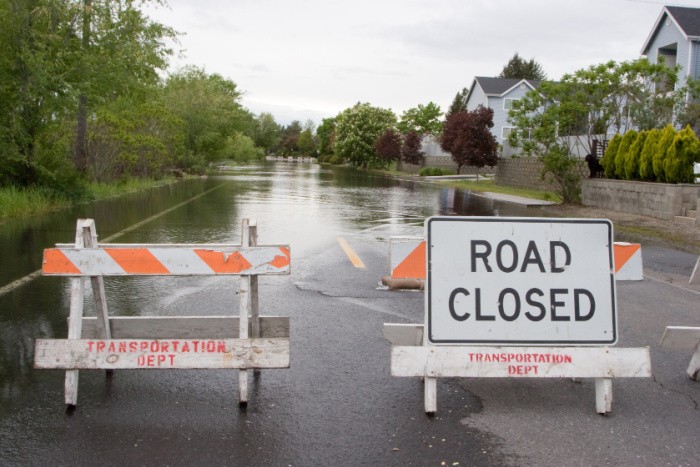
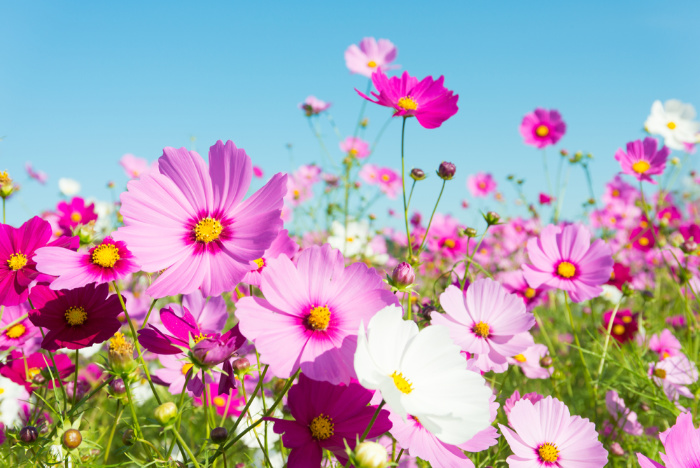
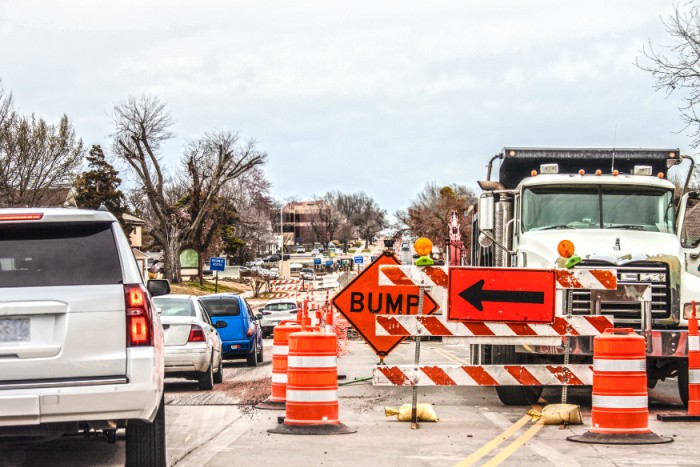
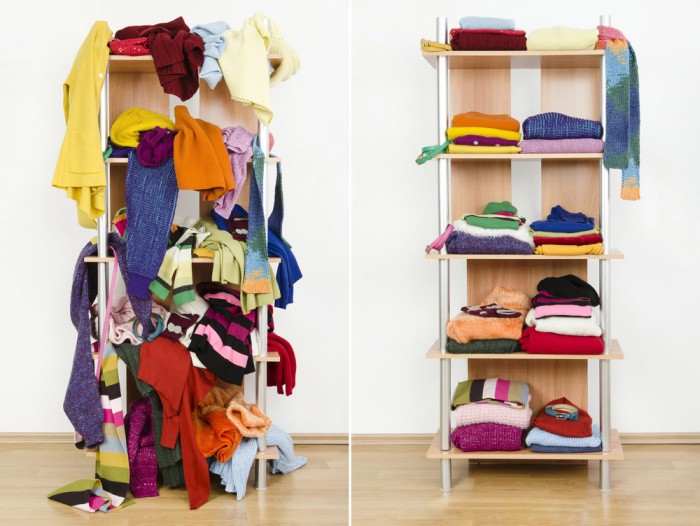
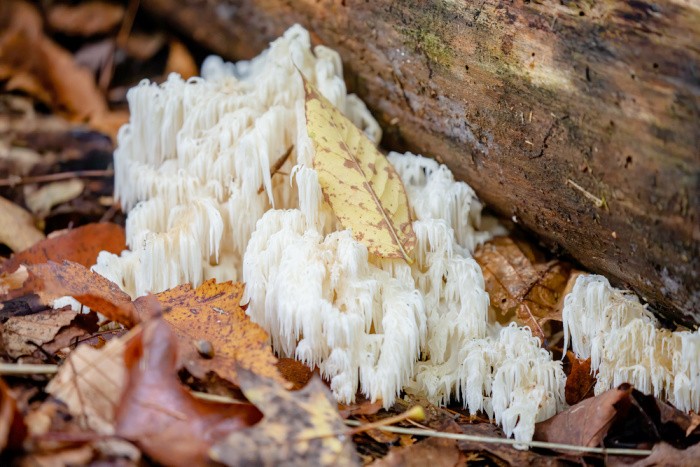
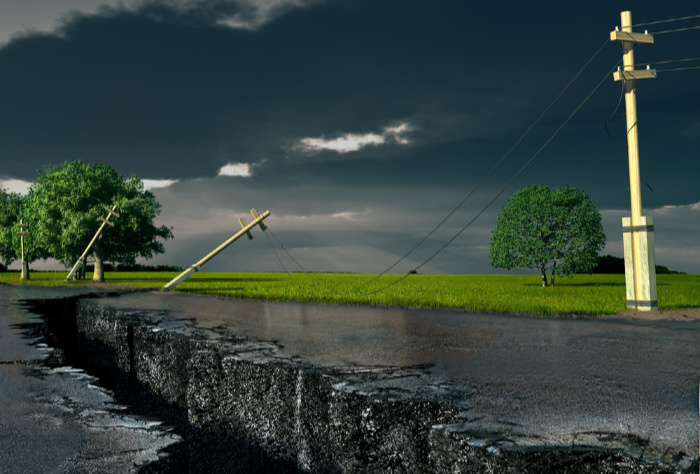
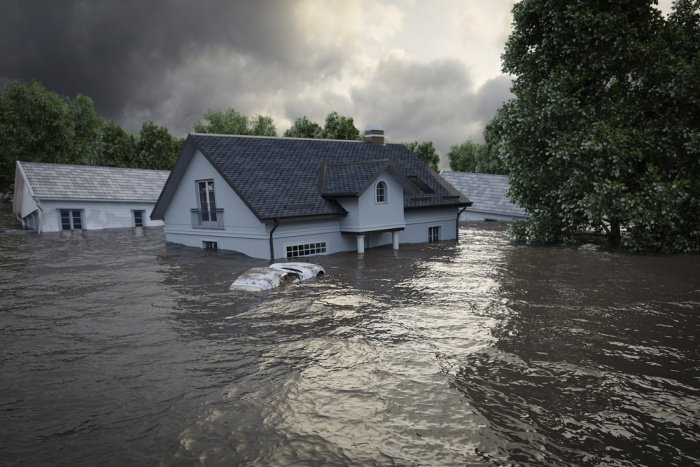


I’m working on stands for plastic 55gl drums split in half right now doing a raised bed container garden.
I’ve done tomatoes successfully with buckets before.
This is definitely a year you want to try your hand at it gardening, continue or expand. Things are just too unstable.
Hi Matt, please send me pictures after you plant, I will share the pictures. Everyone needs to sharpen their gardening skills. I’m glad to hear you have done tomatoes in buckets. We need everyone to grow most of their food going forward. Life is crazy. Linda
Yup
In hindsight as I’m working here make sure the rucks you get fit drainage are larger than the holes you drilled for drainage.
Such a duh moment lol
Hi Matt, oh my gosh, at least you know how to make one of those! Linda
A friend of mine had some buckets that cow minerals came in and planted potatoes in it. She had quite a bit of small red potatoes make in it. I may have to try that. She gave me some of the buckets before she moved to South Texas.
Hi Deborah, I love fresh potatoes picked from the garden. They are so much better than store-bought potatoes. Keep me posted on growing them!! Linda
We’ve grown them in the ground before. We got about 300 pounds. LOL I just want some eating occasionally. We love them with green beans, too. The little red ones.
Hi Deborah, oh my gosh, I have never grown 300 pounds of potatoes! I have the giggles picturing that many! Now, that’s a harvest! Linda
I have a bad fungus in my entire yard and can’t grow much..just hosta, monkey grass, rose of sharon, lilies, and crape mrytle. Everything else has died.
I might try tomato plants, but have to have new buckets, and soil.
Even the concrete blocks used in the raised bed were contaminated. Warned the recipient of those.
Hi JayJay, oh, the fungus is the worst. Wow, you may want to check with your state extension to see how to remedy it. That’s a shame to have land and not be able to grow what you want. Linda
You’ll have to place them where mowing debris doesn’t get to it. A bagger will help
OH, OH,,OH…I have 20 gallon drums in the attic with no lids and I can try to cut them –they
are great trash cans but I don’t need that many trash cans.
Now, if I had someone to cut them…thinking face here.
JayJay
https://youtu.be/FzwzkL6OR88
Use a circular saw. Turn the blade backwards and do not stand directly behind it.
I cut my steel roofing material this way. I just marked the blade with a sharpie and only use it for metal.
Oh, Linda,
When I saw the title of your post, “How to Garden WITH 5-Gallon Buckets” I thought you were talking about taking a 5-gallon bucket and filling it from your neighbors garden. I was afraid you had gone to the dark side. After reading the post, I realized you meant “How to Garden IN 5-Gallon Buckets!” LOL!! Just kidding. Gotta have a little humor now and then.
Hi Harry, oh my gosh!! I have the giggles now!! I don’t know anyone in my neighborhood that has a garden! Those buckets would come home empty!! Oh, my gosh, you made my day!! We all need humor!! I love it! Linda
I am so excited to try this! We are in Maryland and have really hot, humid summers. I grew up with parents who had a huge garden and canned or froze all the produce. My RA keeps me from being able to weed a ground garden, so this sounds perfect for me. And it’s a great homeschool project. : ) We’ve been doing container flowers for years but I just gave up on the idea of a vegetable garden. Thank you for inspiring me! My 10yo daughter is going to love this.
Hi Steff, thank you for your kind words! I hadn’t thought about it being a homeschool project!! I Love it! I love flowers in containers too! They bring me joy! Have fun and enjoy your harvest! Linda
I live in SE Utah (Moab) where it consistently can get well over 100 degrees every day for a month in the summer. We have had a great in-ground garden (and plan to continue it) but would like to try to grow some things in buckets. My question is I have heard the bucket system won’t let the root system be cool and plants die. What does the hive mind say?
Hi Grandutefan, I love Moab! I live near St. George so I’m used to temps higher than 100 degrees in the summer. Stay tuned, I will be taking pictures every single month or so. I want to know if they will work. I grow potatoes in pots but they are 18 inches wide and at least 18-inches high. I have seven four-foot square raised garden beds as well. But people need other options besides the ground or raised beds. Fingers crossed they work, I grow stuff in smaller pots so I have no doubt they will work. Fingers crossed, Linda
Thanks for the reply Linda. We had great success with tomatoes, potatoes and cucs grown in the ground last year. It will be interesting trying some raised bed stuff.
I have started planting in buckets and big flower pots over the years. They are good because I have
bad knees and can’t do a in ground garden anymore. I have a old cistern and have my flower pots
and buckets on it so it is a really raised garden. I can’t wait to get my tomato plants and get them in the “ground”. I have always had home grown veggies. My mom and grandma both had a garden and I
have a smaller garden but still have fresh veggies. I have always had home canned pickles and one time I went to Walmart to buy a jar for some reason and I just stood there looking. I had no idea there was so many kinds of pickles. Took me a while but I finally got a jar. I’ll stick to my home canned ones. Also nothing better than fresh tomatoes, or tomato juice. Even better in the winter.
Hi June, oh, fresh tomatoes are the best! Life is so good when we can plant vegetables and enjoy our harvest. Linda
Can you grow okra in a 5 gallon bucket?
Hi Jerry, I have never grown okra, but I would think you could. It’s worth a try for sure. Linda
I just wanted to share I go to my local feed co op and I buy used empty lick buckets. ( this is a black bucked that used to have salt lick for cows) there little bigger then 5 gallon bucket but cheaper where I live 4.00 most co op feed stores have them you need to ask there not inside where you can see them. They will be nasty inside but little cleaning they work great and easy to move around. .
HI Renee, I love hearing this, it’s tips like this that help us all get the things we need. Thank you, Linda
I have many gallon buckets here and had no idea what other things I can make using these buckets. Thanks for sharing your ideas! can’t wait to make my own garden using buckets!
HI Arthur, you will love growing some items in buckets. Life is good, Linda
How do you companion plant in your buckets? I use mostly containers and I’m still working out how to go about companion planting in them. Last year, I did Basil with my cherry tomatoes but that’s it.
Hi Brittany, companion planting can work if there is enough room. It is a lot trickier in buckets because of the space. I wrote a post on the vegetables that CAN and CAN NOT be planted together. But space will always be an issue in buckets. But it’s worth trying. Linda
Hi, Brittany, just do an on-line search for “companion planting.” You’ll find huge lists of what should (and should not!) be planted together. Books, too.
Hi Rhonda, here is a post I wrote about, https://www.foodstoragemoms.com/companion-planting/. This may hep you. Linda
Another item to use in your planter is non-melting packing peanuts. I have used them in large pots for drainage . they help with the weight of the buckets and pots if you have to move them. No problem with the plants, either. I do redo up to 50% of my potting soil each year. That helps keep down the bacteria that might cause problems with my plants. I also add marigolds, basil, onions, and nasturtiums to my pots and buckets to keep out pests, add flavor and bring in bees for pollination. Always good potting mix, add fertilizer as needed and water. Yes, when it gets hot, shade may be needed, I had to use it last year when it got 106 deg. for a number or days (PNW). It in nice to know that veggies can even be grown on decks.
Hi Cheryl, that’s a great idea on the non-melting packing peanuts!! Great tip! I love adding flowers as well, they bring the bees. It’s hard when the temps get over 100 degrees!! Shade helps for sure. I can’t wait to get my garden going in my new area. Linda
I planted peas, broccoli, lettuce and spinach today. Rain is expected this afternoon and all week, so they will really get watered in. Yes, I have good drainage so no water-logging problem. Remember the Victory Gardens. We need them now!
Hi Cheryl, oh yes we do!! Great reminder!! I’m so excited for you to be planting right before a rain storm!! Linda
Looking to do our garden in buckets this year. How high do we need the soil?
Hi Alex, I filled mine about 2-inches from the top of the bucket. Linda
I remember using old broken clay pots and breaking them down to chunks, instead of buying gravel or rocks, to save money. Thanks Linda!
Hi Jan, oh my gosh, I do too! When I would accidentally drop a small clay pot I would save the pieces! Thanks for the reminder!!! Linda
Even though I have a standard garden, I still occasionally use 5-gallon buckets–often using buckets that have even been retired from the barn (where I use them to clean stalls!) once they get a crack, lose the bail, or whatever.
Check around at restaurants, delis, etc., to see if they have buckets in which they get ingredients or condiments. Sometimes they sell them for a dollar or two, but sometimes you get lucky and they give them away! No extra charge for the pickle scent! (And I sometimes get molasses or supplements in buckets for the animals, too.)
If you’ve ever wanted to try “upside down” planting, buckets work nicely for that (lots cheaper than the special-made bags and such). Just cut a hole in the bottom of the bucket (that circle that shows is plenty big). Hang the bucket at a convenient “working” height while you plant (of course you’ll hang it higher, maybe on your porch or deck, or on a cast-iron bird-feeder hook, for the growing season). Tomatoes and peppers work well… Take your seedling out of its pot and feed the plant top down through that hole you made. Might need another set of hands to steady the plant while soil is added to the bucket, around the root ball; a couple of coffee filters, flattened out and a slit cut to go around the stem, can be a good way to keep soil from dribbling out the hole. Fill the bucket up to within 2-5 inches of the top, and add a good layer of mulch of your choice. Water as necessary. Enjoy your hanging greenery (and the produce!)
HI Rhonda, oh my gosh, I have seen some of those purchased upside-down growing deals for tomatoes! Your idea is awesome! I’m with you as long as the buckets are food grade, buy them cheap or get them from bakeries, or restaurants! Love this reminder! Linda
This is the first year I plan on growing in buckets. I am a finisher and have about 20-5 gallon buckets that my water based finish comes in (I clean the completely when they are empty), I have been told by my supplier that as long as they are completely clean they are safe.
I want to plant potatoes (both sweet potatoes and regular), butternut squash and acorn squash, as well as watermelon). Someone suggested for the potatoes to cut numerous large holes around the sides of the bucket for the actual potatoes grow through (similar to strawberries). Is this possible? Would planting the squash and watermelon work the same?
Lou
Hi LouAnn, how exciting you have 20-5 gallon buckets ready to plant! We drilled (4) 1/2 holes in the bottom of the buckets, filled with gravel then soil, the holes and rocks are for drainage. As far as drilling some holes on the sides, it may work but my fear is loss of water. The potatoes do not grow on the vine, they grow in the dirt, thus we dig for them. I would experiment with 3-4 buckets, then you will know for future plantings. The strawberries grow on the vine but need dirt to replant, that’s the only way I can explain it. They send off shoots and root for future new plants. Sweet potatoes grow really long vines, but the ones I have planted I was digging for years. It’s awesome. I thought I got them all and each year new ones came up, love it! Practice, and try whatever you can think of, what can hurt. Just remember the buckets dry our faster than the ground. Watch for dryness. Linda